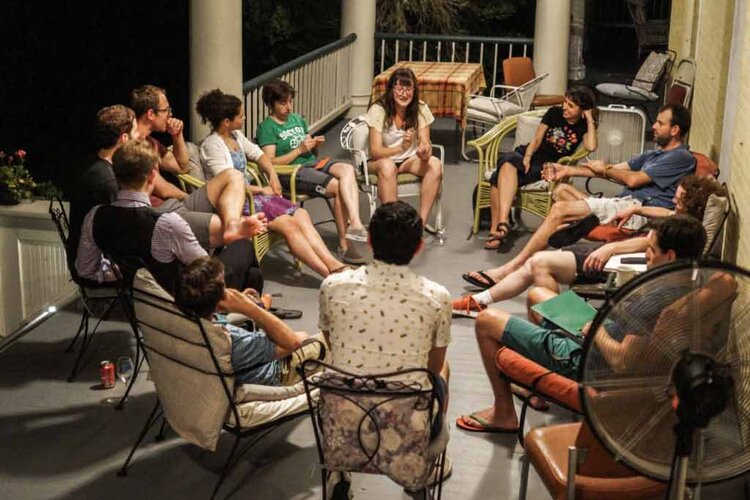Contents
- What Is An Immersion Program In Latin?
- Finding The Right Program
- Date & Duration: When And How Long?
- Where Is The Program?
- How Much Do Courses Cost?
- Restrictions And Prerequisites
- What Is The Curriculum?
- Ask Online About The Program
- Where Can I Find A Latin Summer Immersion Course?
- Additional Suggestions:
More and more schools embrace using Latin communicatively to make learning Latin more effective and enjoyable. During the summer, there are even immersion courses where students spend days or weeks together, taking classes and speaking only Latin.
Having taught in several such programs, I have heard firsthand about the difficulties of finding the right course. In this article, I will help you find the best one for your situation.
To find the best summer immersion course in Latin for you, consider the following questions:
- When and how long is the program?
- Where is the program located?
- What is the price? Are there scholarships or student discounts?
- What is included in the price?
- What are the prerequisites: age and Latin ability?
- What is the curriculum like?
- What do participants from previous years say about the program?
There’s a lot to consider when deciding what program to go for.
Let’s go through the most important aspects to consider when choosing one.
What Is An Immersion Program In Latin?
First, let’s go a little deeper into what these summer immersion courses are and what their purpose is.

In traditional Latin programs, students spend most of their time learning grammar and translating from Latin into their language. Although this method has its merits, it is limited, excluding many of the fascinating and beneficial activities common in modern language classrooms.
The Latin summer immersion courses we are discussing here are very different from traditional Latin programs and are a perfect complement to conventional methods.
You are perhaps familiar with immersion programs in modern languages, where people use only the language they are studying to communicate. This is the basic idea of Latin programs as well, but perhaps with a little more focus on reading and literature.
Most immersion programs in Latin take place over a week or a bit more. Students and teachers often live together on campus or in a larger house. During the week, there are lessons in Latin, readings, and ample time for socializing in Latin, with games, dinners, and parties–where everyone speaks Latin.
The purpose of these immersion courses is to help students internalize as much as possible of the language through constant exposure to the syntax, morphology, and lexicon of Latin—all while having fun and getting to know people with similar interests.
Finding The Right Program
There are many things to consider when deciding on an immersion program. Let’s start.
Date & Duration: When And How Long?
The first thing to consider is when you would like to participate in a program. There are Latin summer immersion programs from early June to late August and September.
Next, consider how long you would like the program to be. Here too, there are significant differences; some run for a weekend, while others one, two, or even three weeks. Here you should not only consider if you have the time in your schedule but also if you think you would like to spend e.g., two or three weeks speaking only Latin. Many treat these programs as a substitute for vacations but remember that they can be very taxing if you are not used to speaking Latin.
Let’s say you’d like a one-week program in July. The question is then where?
Where Is The Program?
Country
The majority of Latin summer courses in spoken Latin are in the United States and Europe. There are also courses in Central and South America.

If you can afford it, consider attending a Latin immersion course abroad because combining speaking Latin with discovering a new country and culture is a fantastic experience.
Rural vs. Urban
When looking at different places, you might also consider if you’d prefer the course to be in an urban or rural area. Some courses are on university campuses close to or in cities, while other programs take place in rural areas. The latter is better if you want to create a truly immersive experience where you have no interaction with languages other than Latin. Such 100% Latin immersion is more challenging to achieve if there are restaurants and cafes close by since participants will tend to visit them sooner or later :).
Since some programs are in rural areas, make sure you can get there. Use Google Maps to see how to get there, and if you would need to have a car. In such cases, many programs try to coordinate with participants and provide transportation from the nearest airport or city.
Next, it’s time to consider the price of the summer course.
How Much Do Courses Cost?
The prices of these Latin summer programs vary widely, ranging from a few hundred dollars to a few thousand dollars. Courses in the United States and Western Europe tend to be the most expensive.

Note that the price depends not only on the location and duration but also on what is included. Many programs include tuition, housing, and sometimes even food, in their price, while others include only tuition. Make sure you ask what is included!
Reducing Cost
To reduce expenses, remember to see if you have friends or relatives nearby with whom you could stay. Another way of reducing costs, especially for students, is to apply for scholarships. Various associations working to promote classics offer scholarships, and sometimes the schools offering the immersion courses have their own scholarships.
If you are a teacher, some schools allow teachers to take these courses as professional development. Make sure to ask what is possible!
Another way to reduce costs is to ask if you could help out with the organization of the course or any other way to get a reduced course fee.
Refund Policy
Since some courses cost quite a lot of money, it might be a good idea to ask if there is a refund policy in case something comes up and you can’t attend the program.
Restrictions And Prerequisites
Age
Remember to find out if the program has an age limit; do you have to be 18, 21, or 65? Most programs are for adults, so underage students would not have any dedicated supervision from staff. There are, however, programs for younger students of high school age, but these are fewer. As with everything else, write to the organizers and ask. If they get many requests for a group for younger students, perhaps they can organize a separate event tailored to them.
Latin Experience
A critical thing to ask is what the prerequisite Latin level is, i.e., how much Latin should you know? How much Latin speaking experience should you have?
There are sometimes different groups for different levels. It can be a very stressful experience if you end up in a group where your ability to express yourself and understand is far below that of the others. It is often hard for organizers to define the necessary prerequisite ability because students often differ from year to year. But make sure you get a clear idea of the Latin level of participants of previous years.
That being said, remember that it is a learning experience, so you don’t have to be Cicero!
What Is The Curriculum?
Many Classes, Or Much Free Time?

There are great differences between programs in terms of how the day-to-day of the program looks. Make sure to look at the schedule or write and ask so that you know what to expect when you get there. Ask what the day-to-day activities are.
Some programs have a heavy course load, with many hours of classes each day, while others have fewer classes and focus more on learning through discussion and socializing.
Ask Online About The Program
Find Students Who Have Participated
Finally, the best is to find people who have already participated and to ask them. You can easily find people in the spoken Latin groups on Facebook or Twitter. Just leave a post asking about peoples’ experience in a particular Latin program. It’s a good idea to ask several people about their experience of a specific program, as it is very subjective, and the programs change from year to year.
Where Can I Find A Latin Summer Immersion Course?
Now that you know what to consider when choosing a program, you are ready to pick a course! As mentioned, there are Latin summer immersion courses in many different countries, and it can be hard to find out about them. That’s why we have compiled a list of summer courses. Note that we have to affiliation with any of them.
Additional Suggestions:
Listen to Latin. One of the most shocking aspects of attending a spoken Latin immersion course for the first time is that you have to process Latin in real-time. There’s no possibility of looking back at the subject or skipping to the verb. You can always ask the other person to repeat! An excellent way to prepare is to get into the habit of listening to Latin. To get into the habit, you can watch video lessons all in Latin published every week here.
Go with a friend. Participating in an immersion program for the first time can be a fantastic experience, but sometimes also stressful. A great way to reduce stress can be to participate together with a friend. That way, you can also prepare and perhaps get used to speaking Latin in the months leading up to the program. If you can’t persuade a friend to participate, go to one of the Latin groups on Facebook, and get to know other people participating in the same program.
Speak Latin. Make sure you try to speak Latin before you attend the summer course so that the first time you do it, it’s not entirely new to you, and you can feel more confident. Practice speaking Latin to yourself or with others in conversation groups online and offline.
Prepare. In many programs, classes will focus on a set number of texts or topics. To prepare, you can ask the organizers which these are and study the texts, and perhaps learn the vocabulary relevant for the central topics of the course. Organizing summer programs is often a colossal task, and frequently understaffed, so it’s a good idea to wait a while to allow them to decide on the course material.
Good luck! I hope you find a great Latin program and that you have a blast and learn a lot! Bene vale!
















